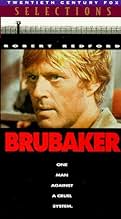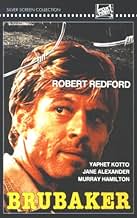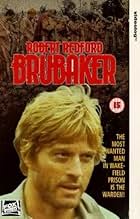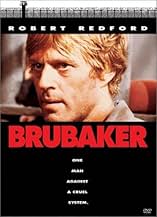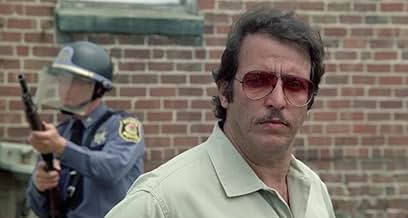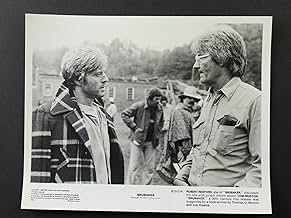A la prisión estatal de Wakefield llega un nuevo interno con una curiosidad especial por todo lo que allí sucede. En un momento especialmente crítico se da a conocer como Henry Brubaker, el ... Leer todoA la prisión estatal de Wakefield llega un nuevo interno con una curiosidad especial por todo lo que allí sucede. En un momento especialmente crítico se da a conocer como Henry Brubaker, el nuevo director de la cárcel.A la prisión estatal de Wakefield llega un nuevo interno con una curiosidad especial por todo lo que allí sucede. En un momento especialmente crítico se da a conocer como Henry Brubaker, el nuevo director de la cárcel.
- Dirección
- Guión
- Reparto principal
- Nominado para 1 premio Óscar
- 1 premio y 4 nominaciones en total
- Burl Willets
- (as Ronald C. Frazier)
- Duane Spivey
- (as David D. Harris)
Reseñas destacadas
The lead character, played by an unusual and remarkable Robert Redford, is introduced to us as a prisoner who barely speaks but observers everything concerning how inmates are treated by the guards, how the machine works behind bars and the constant brutality of the place. The plot twist to everyone is when he presents himself as the new warden and he sets up a whole reformation on the place, condemning what's wrong and doing what he believes it's right. There's plenty of benefits for the prisoners but the guards and the businessman who always gained advantages with the old administration aren't happy about this, and that misery and dissatisfaction goes back to the people who hired him, the governor and his staff who now pressure the man to go easy with his work. After all, they are losing a lot of money obtained with frauds and illegal schemes. One man alone means nothing so Brubaker is helped by some inmates and a local authority (Jane Alexander) who is close to the state governor, and will try to convince everyone that Brubaker's idealism if put to work can be profitable for everyone involved.
Brubaker's idea isn't just to denounce the illegal affairs of the state and make budget cuts. He's more concerned with the way convicted felons are treated, want to stop their exploitation and make the place a safe environment instead of the critical animal factories that don't punish anyone but is only useful to transform them into bigger monsters whose only fate is either death, or commit more violent crimes or to return to the animal factory again. Sure, this idea is good and valuable but not practical. In the film's case, it fails because one can't change a system unless if one being part of it; Brubaker made the terrible mistake of not firing the whole officials team, and those guys still managed to cause harm and work their way behind his back; and the people with the money will always speak higher.
Such idealism wouldn't work today, that's sure but it could worth a shot, specially in countries where the private initiative isn't the option (because politics are having their big time with a failing system that pays them well). Today's criminal minds are far more worse than the ones from the 1980's when this was made and they probably wouldn't leave a place where they could feel as if being on a hotel, practically with the cell keys on their hands, dictating orders like Pablo Escobar did in his "prison" time. But it can be made. And that final image of accomplish given here says everything even though things didn't turned the way it could.
The film has a fine progression and it's greatly well acted by Alexander, Redford and heightened by convincing performances from trustworthy character actors Everett McGill, David Keith, Yaphet Kotto, Matt Clark, M. Emmet Walsh, Murray Hamilton and a young Morgan Freeman. "Brubaker" has that rare quality of being dreamy, that enlightening power some movies have in our reality and we want to believe of making a dream possible. To change the world. 8/10
He manages to carve a bond with a few prisoners before he modestly reveals his true identity and, through a series of well acted confrontations, he begins to make the prison machine tick over nicely. In the final analysis his efforts are not totally successful, but the film does reflect change and at least the viewer can agree that he seized the chance to make a difference.
The film is possibly a bit too long and the principal character is under-developed. 'Brubaker' was apparently a rather mournful, strained film to work on and the original director, Bob Rafelson, was sacked for smacking Ron Silverman (producer) in the nose during an early on-set argument.
However, I think it is well acted and very absorbing to watch. I particularly enjoyed the scene where Brubaker gets his staff to release a few long term solitary confinements, stating that before they do so, the requisite pairs of sunglasses should be given to them as they come out of complete darkness for the first time in ages - the staff think Brubaker is crazy: of course, they cannot see that this is all about building trust. The master plan is therefore to get the inmates on board and allow the trustees to follow. Nice theory, not so nice to put into practice as he is up against a rancid, but self policing establishment from day one.
Watch out for Wilford Brimley as "Rogers" - a later teaming up with Redford took place in the outstanding "The Natural", with Brimley starring in a major role as the jaundiced, downtrodden, Pop Fisher.
A good, feel-bad movie; and as a Bostonian, it's hard to hate a film that has a character in it named Fenway Park.
Based on the true life experiences of Thomas Murton, the co-author of the book the film is based on, Brubaker captures the realities of prison life, the complexities of trying to "reform" the system without sacrificing one iota of entertainment.
Robert Redford leads a great ensemble cast in this film. The people here are real, dealing with complex issues for which there are no simple answers. The corruption of the penal system runs deep and helped in part by the prisoners themselves who don't want to see too much change at once or have a vested interest in seeing things run just as they are. Yaphetto Kotto and Tim McIntire are two such prison trustees, both of them showing very different reasons why they don't like some or all of what Redford is doing as warden.
Among the supporting cast, I'd like to single out David Keith who was the best as the prisoner whose life Brubaker saves and ultimately becomes his biggest booster in the joint. A really outstanding job by David Keith as this simple country kid who just got caught up in "the system."
Rare you can say a film is informative as well as entertaining, but Brubaker definitely fits in both categories.
If you happen to live in the Deep South where prison farms have used convicts as virtual slave labor for years, you can appreciate the story
as well as the attitudes of the government and local officials who are portrayed. If you are not from that kind of background, then it is a revelation for you.
This film is a portrayal of the attempt at prison reform in Arkansas undertaken by Thomas Murton. In the process Murton discovered untold corruption and evidence of multiple murders by previous prison administrations. When he attempted to bring this to light he was threatened with charges of grave robbery.
I would heartily recommend this film. It is one of a kind.
¿Sabías que...?
- CuriosidadesBased on the real-life efforts of former prison administrator Thomas O. Murton to reform Tucker and Cummins Prison Farms in Arkansas in 1967-68. The film was based on the 1969 book, "Accomplices to the Crime: The Arkansas Prison Scandal" by Murton and Joe Hyams. Murton also served as a technical adviser for the film.
- PifiasAt the end, when the car is leaving the prison, the grass around is violently shaking revealing the helicopter carrying the camera.
- Citas
Richard 'Dickie' Coombes: What you gon' do about Abraham?
Henry Brubaker: I've got Purcell filling out forms in triplicate, and I'm going to get him released just as soon as I-
Richard 'Dickie' Coombes: Now why do you wanna go and do that?
Henry Brubaker: Do what?
Richard 'Dickie' Coombes: Look, why don't you just leave him be. I mean, all he knows is this place.
Henry Brubaker: You - You knew that he had been in here as long as he'd been in here.
Richard 'Dickie' Coombes: Just leave him alone. He's not- He's not botherin' nobody here.
Henry Brubaker: Hey... You can't hide in prison forever, Coombes.
- Créditos adicionales"We wish to pay tribute to Richard Ward, who played 'Abraham,' for a lifetime of very special work."
- ConexionesFeatured in Siskel & Ebert & the Movies: Robert Redford (1992)
- Banda sonoraAll for the Love of Sunshine
(uncredited)
Written by Mike Curb, Harley Hatcher and Lalo Schifrin
Performed by Hank Williams Jr.
Heard when the steer is dropped off at the diner
Selecciones populares
- How long is Brubaker?Con tecnología de Alexa
Detalles
Taquilla
- Presupuesto
- 7.000.000 US$ (estimación)
- Recaudación en Estados Unidos y Canadá
- 37.121.708 US$
- Fin de semana de estreno en EE. UU. y Canadá
- 2.748.079 US$
- 22 jun 1980
- Recaudación en todo el mundo
- 37.121.708 US$
Contribuir a esta página





